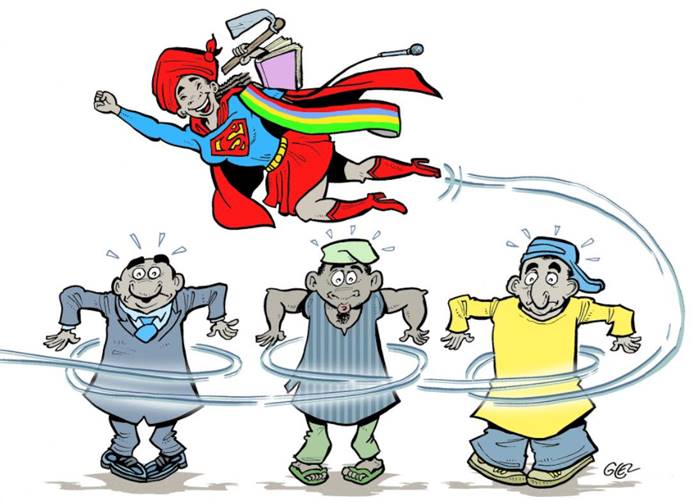
Women have acquired various rights in West Africa, varying from country to country: equal political representation in Senegal (2010); laws criminalising FGM Where ? (1999); inheritance of nationality (Senegal). But many rights are still not legally guaranteed, such as access to land in Senegal, Mali, Niger, and Cote d’Ivoire. Many existing laws are not implemented, and behaviour continues to be shaped by traditions that legitimise gender inequality.
Recent trends in West Africa do not seem to be moving towards greater equality and rights for women. It is women who pay the greatest price for new or renewed human rights violations and the retreat of good governance and the rule of law in some countries.
Terrorism: Women are victims, and sometimes instruments (Northern Nigeria, South-east Niger)
Conflicts: Whichever side they are on, women are the first victims, and transitional justice processes (Mali, Cote d’Ivoire, Sierra Leone, Liberia) do not make any gender-specific provision for them
Civil rights: Strong currents of religious fundamentalism obstruct the promotion and application of civil rights for women (for example, the Family Code in Mali, early marriage in Niger)
Political rights: Women occupy only between 12% and 30% of elected posts
Economic rights: Women’s income is on average 20% less than men’s. In areas where land has been taken over by national or international commercial enterprises, rural women are the first to lose. In the formal sector, women’s income is sometimes only 50% of men’s. In general, laws guaranteeing women’s right to own and manage their assets are weak or non-existent.
Young women are doubly victims – of gender inequality and also of generational inequality, in both private and public spheres, in civil society and in state institutions.
Media contribute little to promoting women’s rights or changing public opinion and behaviour. They generally reflect the growing conservatism of public opinion. Women are invisible in 70-90% of print articles. Where they are mentioned, it is in traditional and secondary social roles, using a language of stereotypes that devalues them. Meanwhile women’s chances of promotion to responsible positions in newsrooms are obstructed by a ‘glass ceiling’ and sexual blackmail.
The promotion of women’s rights, and the fight against discrimination and prejudice, are high priorities for PIWA, in a context where human rights seem to be more and more at the heart of clashes of opinions. PIWA contributes to strengthening the capacities of actors for social change to promote social justice for women and defend their rights.
PIWA develops specific projects dedicated to women’s rights and gender equality. In addition, all its projects on other themes take gender aspects into account, and over all its projects, PIWA aims that 40-50% of the beneficiaries should be women.
| Objectifs | Actions |
|---|---|
| 1.To raise awareness, strengthen capacities and support journalists in the practice of gender-aware journalism |
|
| 2.To strengthen the communication capacities and increase the influence of organisations defending women’s rights |
|
| 3.To strengthen synergies between civil society organisations, and between civil society organisations and media, in communication strategies, and in advocacy to decision-makers and public opinion |
|
| 4.To lobby media organisations (media associations, regulatory and self-regulatory bodies) to institutionalise concern for gender dimensions of media content |
|
The project aims to defend women’s rights in the face of rising conservatism and exclusion.
Women’s rights are violated to some extent all over West Africa. Violence against women is widespread; the figures are alarming, yet the topic is taboo in both private and public spheres. Women are under-represented in all decision-making fora. Fewer than 10% of members of parliament are women in Niger, Mali and Cote d’Ivoire (Senegal is the exception) – though all four countries have ratified the principal international and regional conventions on women’s rights.
Despite the rise in violations of women’s rights, media do not cover them adequately. The space devoted to women is on average less than 15% of the editorial space in newspapers, and media reproduce the stereotypes that obstruct gender equality.
Civil society organisations committed to defending women’s rights work to raise awareness, but their activities are very little reported in the media. The CSOs do not sufficiently exploit the considerable new opportunities offered by new and social media to advocate and mobilise for women’s rights.
To address these challenges, PIWA has established the project, Women: Occupy the Media! for four years, 2016-2020, in Senegal, Mali, Niger and Cote d’Ivoire. The project is financed by the Netherlands Ministry of Foreign Affairs through its FLOW 2 programme (Funding Leadership and Opportunities for Women).
Organisations defending women’s rights in Senegal, Mali, Niger and Cote d’Ivoire will contribute to the active promotion of women’s political participation and the fight against gender-based violence.